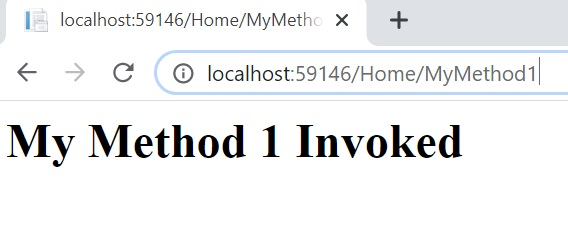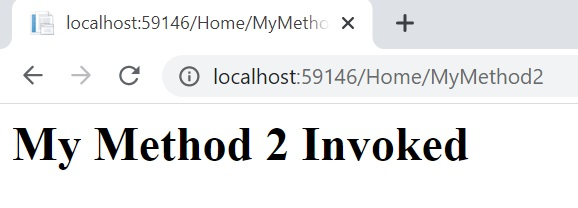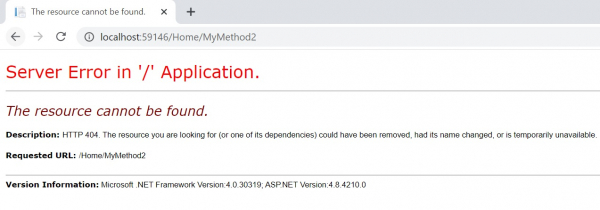
When we want to use a public method in the controller but don't want to treat it as an action method, we can use the NonAction attribute. Action methods are public methods in the controller that can be called using a URL. So, by default, if there is any public method in a controller, it can be called using a URL request. To restrict access to public methods in a controller, you can use the NonAction attribute.
Now let us consider that HomeController has two public methods MyMethod1 and MyMethod2.
using System.Web.Mvc;
namespace DemoMvcApplication.Controllers{
public class HomeController : Controller{
public string MyMethod1(){
return "<h1>My Method 1 Invoked</h1>";
}
public string MyMethod2(){
return "<h1>My Method 2 Invoked</h1>";
}
}
}Let us call these two methods in HomeController using the following URL.
http://localhost:59146/Home/MyMethod1
##http://localhost:59146/Home/MyMethod2<强>


using System.Web.Mvc;
namespace DemoMvcApplication.Controllers{
public class HomeController : Controller{
public string MyMethod1(){
return "<h1>My Method 1 Invoked</h1>";
}
[NonAction]
public string MyMethod2(){
return "<h1>My Method 2 Invoked</h1>";
}
}
}
The above is the detailed content of What is the meaning of NonActionAttribute in ASP .Net MVC C#?. For more information, please follow other related articles on the PHP Chinese website!
 Can Microsoft Visual C++ be uninstalled?
Can Microsoft Visual C++ be uninstalled?
 Introduction to the plug-ins required for vscode to run java
Introduction to the plug-ins required for vscode to run java
 How to solve an error in the script of the current page
How to solve an error in the script of the current page
 Cryptocurrency exchange rankings
Cryptocurrency exchange rankings
 How to solve the problem that cad cannot be copied to the clipboard
How to solve the problem that cad cannot be copied to the clipboard
 How to register on Matcha Exchange
How to register on Matcha Exchange
 Which is better to learn first, c language or c++?
Which is better to learn first, c language or c++?
 How to embed CSS styles in HTML
How to embed CSS styles in HTML




